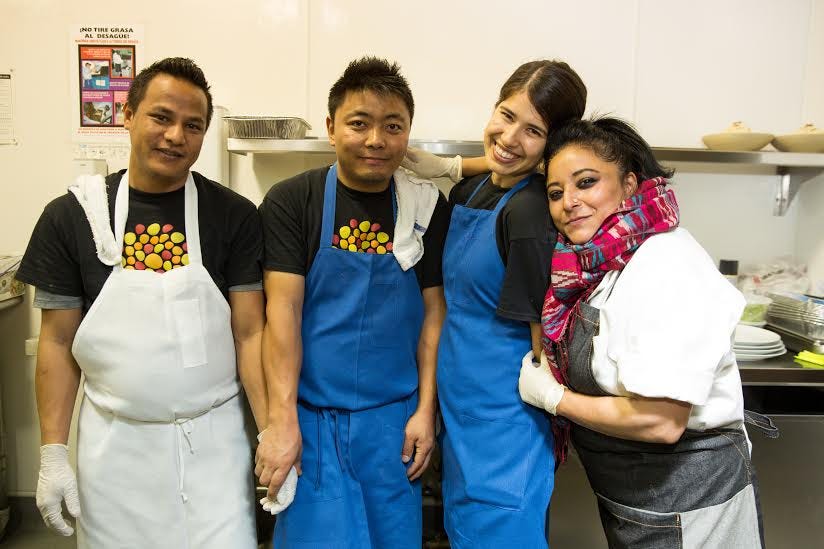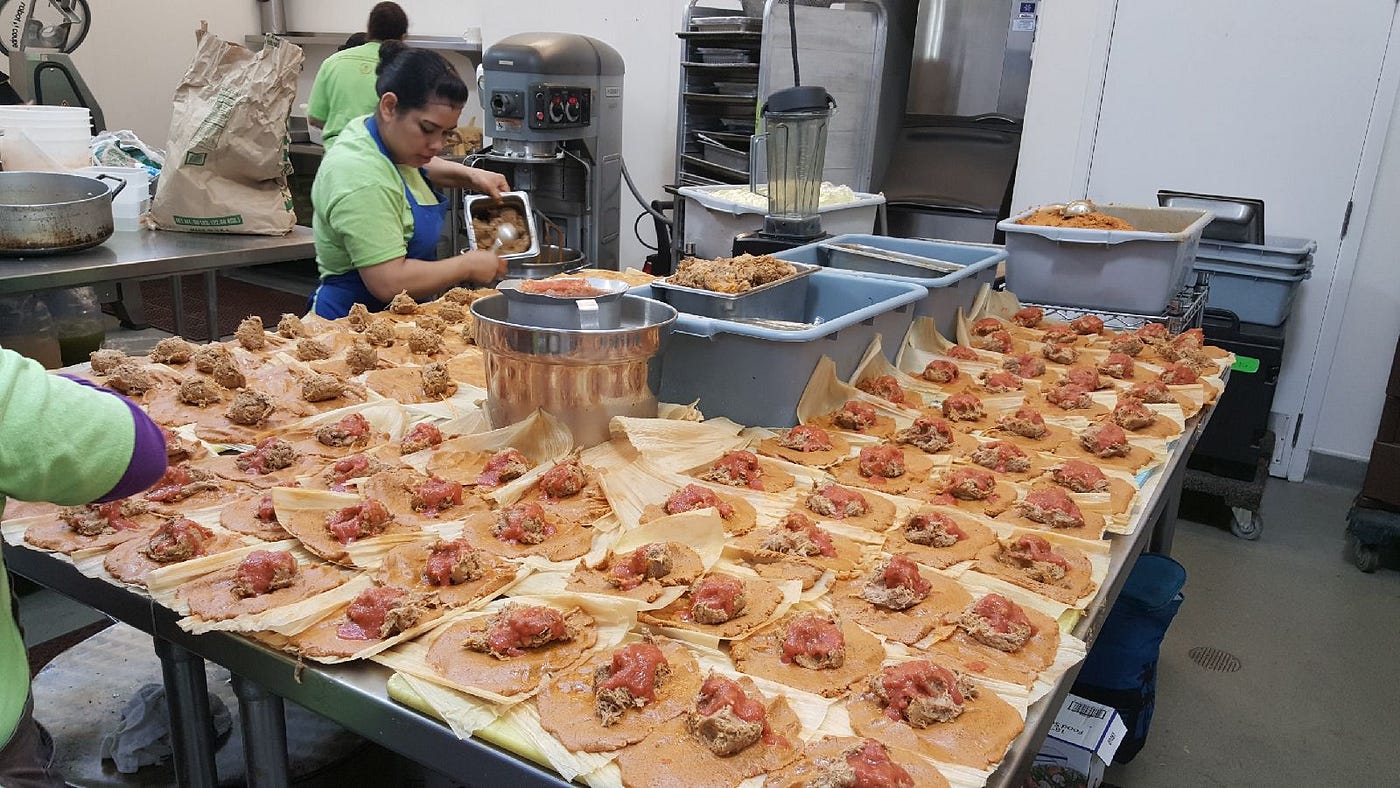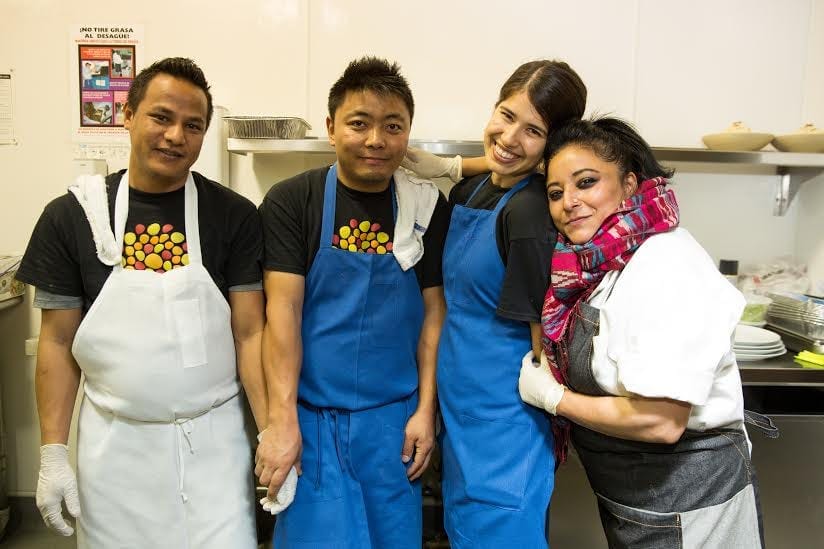
If you haven’t heard of La Cocina, chances are you’ve unwittingly devoured food made by one of their businesses. Whether dishing out tamales at Outside Lands, momos in the financial district or kuy teav and man’oushe in Fruitvale, La Cocina participants past and present have transformed the perception that leadership in the food industry or small business ownership is exclusive to white men. In a city rife with economic inequality and a national political climate that threatens the immigrant community, La Cocina enables women of color to not only build economic self-sufficiency but also serve fortifying stories of resilience and cultural diversity through their food.
Founded in 2005, La Cocina is a nonprofit food incubator that helps mostly low-income women of color and immigrant women establish their food businesses. Of the 39 food businesses La Cocina supported in 2017, 28 owners were immigrants; 90 percent were women; and roughly 80 percent came from communities of color. By offering affordable kitchen space and comprehensive business guidance, La Cocina helps entrepreneurs from underrepresented communities make it in the highly competitive and stratified food industry.
Incubation: Getting off the Ground
The range of services La Cocina provides to lower barriers for aspiring women entrepreneurs is astounding. Six times a year, La Cocina hosts public “How to Start Your Food Business” orientations. For those who are more serious about applying to their incubator program, La Cocina offers application workshops and connects applicants to nonprofits such as the Mission Economic Development Agency for assistance with business-plan writing. These steps ensure that the incubator program is more accessible to chefs who show promise but may have difficulty completing the extensive application forms due to language or education barriers.
Once selected, entrepreneurs dive into pre-incubation for eight months. During this time, La Cocina staff and pro bono volunteers lead classes covering everything from marketing to product development to operations. For Kana Azhari of the Healing Kitchen, which joined La Cocina in November, one of the most important lessons she has gleaned so far is how to integrate simplicity into her business, from the dishes she selects for her menu to the narrative she tells when explaining her distinct Afro vegan plant-based cuisine.
Equipped with the knowledge from this curriculum, entrepreneurs like Azhari will then enter the incubation phase and officially begin production out of La Cocina’s commercial kitchen space. Conscious of the economic burden commercial that kitchen-rental prices place on early entrepreneurs, La Cocina rents out its space at a starting price of $12.50/hour (compared to commercial prices, which can reach as high as $45/hour) and increases that rate over time to $21/hour to match the growing profitability of the business.
It’s during incubation that La Cocina also helps its clients develop crucial sales opportunities through farmers’ markets, La Cocina’s own catering program and local retailers. According to Jessica Mataka, development and communications manager at La Cocina, the network and name recognition that La Cocina provides is the organization’s strongest asset: “If you’re a small business owner that’s just getting started, how do you prove your credibility? How do you get these companies to take you seriously? We’re this umbrella brand that is able to create these opportunities.” For entrepreneurs like Binita Pradhan of Bini’s Kitchen, La Cocina has helped her secure a spot at countless popular markets ranging from Off the Grid to CUESA’s farmers’ markets at the Ferry Building and Jack London Square. Working from just two tables in La Cocina’s kitchen this past year, Bini and her staff earned nearly a million dollars in sales.
Just as La Cocina helps its entrepreneurs solidify their businesses, they also help them transition to their own space. Following what has traditionally been a period of five years (although some have graduated in as little as three), entrepreneurs may go on to pay market rate for commercial kitchen space or open a brick-and-mortar location of their own. During this process, La Cocina helps entrepreneurs search for a location, complete the onerous permitting process and secure funding. Twenty-three businesses have gone on to open brick-and-mortar locations, including Cambodian eatery Nyum Bai, which just opened in February, and Bini’s Kitchen, which is slated to open its first full dining restaurant in SOMA this year.
Building a New Kind of Food Industry and Economy
Given its commitment to serving women from underrepresented backgrounds, La Cocina is doing nothing short of changing the face of the food industry. According to a 2015 report by the Restaurant Opportunities Center United, women of color are the lowest earners in the restaurant industry compared to their male and white women counterparts. While white men earn $14.18/hour, women of color receive only $10.13/hour. Unlike other incubators or for-profit businesses, La Cocina is transformative in that it fundamentally works to empower women and address poverty via small business ownership.
Mataka explained the economic significance of entrepreneurship for La Cocina’s clients: “These are women who have worked for 10 to 15 years in the back of house for other restaurants, in a hourly-wage position with a finite cap, and despite the incredible amount of hard work it will take, for the first time in their lives they want to start a business that they can call their own and [build] a legacy they can pass down to their children.”
La Cocina graduates are already cultivating change in their communities. Not only do they sell food at affordable prices, but also they have generated hundreds of local jobs. Whereas Binita Pradhan of Bini’s Kitchen has created job opportunities for Nepali, Indian and Tibetan immigrants, Reem Assil of Reem’s strives to pay her employees above minimum wage. Meanwhile, Alicia Villanueva of Alicia’s Tamales Los Mayas gives her 16 employees steady work hours even when business is slow. She even encouraged a former staff member, Guadalupe Guerrero, to start her own business through La Cocina called El Pípila, which will open a brick-and-mortar location later this year.
Shakirah Simley, community organizer and cofounder of Nourish|Resist, emphasized the broader social impact of women-owned food businesses: “La Cocina is a powerful model, as it recognizes the agency and creativity of women, those who are often ignored, discounted and not supported in the business and food world…This is the power shift — women, immigrant and people-of-color leadership — that we need to see in order to truly change the food system.”
What Else Is Cooking
Although historically La Cocina participants have been Latina women in their 40s and 50s, a newer wave of La Cocina entrepreneurs in their 30s are determined to cook food that showcases the diverse flavors of their cultures while striving to cultivate health and community. According to Kana Azhari of the Healing Kitchen, her dishes, like spicy kale salad or vegan gumbo, take inspiration from the cuisines of the African diaspora and are “culturally relevant, really nutrient dense and healing.”
When elaborating on the vision behind her business, Azhari said, “The goal ultimately is to bring communities of color, specifically black, Caribbean and African communities that have the highest rates of health concerns, many of which are diet based, into the understanding that our food and culture can be upheld…Often folks think healthy food means you have to suffer for your health. No, we don’t have to suffer. We can embrace flavor and the dynamic aspect of a culinary experience but also be mindful of our ingredients and how we prepare it.” Ultimately, Azhari sees her business becoming a catering company that serves private firms, nonprofits and schools so that communities of color can access familiar foods while also exploring plant-based dishes they can cook at home.
In 2018, La Cocina continues to cultivate a cultural, political and economic landscape to help chefs like Azhari thrive in such a costly city. Tonight marks the first day of the annual La Cocina Conference, giving anyone from chefs to policy advocates the opportunity to collaboratively envision ways in which food businesses can drive just economies. A diverse lineup of speakers, including the likes of Gustavo Arellano, Preeti Mistry, Tunde Wey and Naomi Starkman, will discuss food as it connects to larger contexts such as race, politics or the need for affordable housing for food workers. Later in the year, La Cocina also plans on opening a groundbreaking municipal market that will offer entrepreneurs an affordable hub where they can cook and serve their food at reasonable prices to members of the local community.

This innovative, expansive vision of La Cocina and its growing family of businesses ensure that the Bay Area will continue to serve eclectic eats and lift up passionate women entrepreneurs in the food industry.







